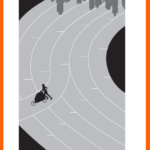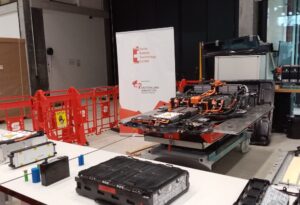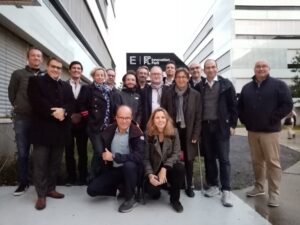Welcome to Stadium City!
Welcome to Stadium City!
Mikalia and Raouf neotransport themselves to Beijing and discover the first ‘stadium city’.
Raouf isn’t up to speed with this new mobility.
“Raouf, ready for a trip into new mobility?” asks Mikalia.
Raouf nods in agreement. He’s up for any kind of mobility in the company of Mikalia. Pas de deux, steamy tangos, torrid waltzes…. Even putting on hold for a while his habit of rushing from one girlfriend to another isn’t out of the question.
“New mobility, new wave, new cuisine, new novel…. New is often very old,” he adds, to conceal his unease.
“New can also be really new,” replies Mikalia. “For instance, it allows me to dream of the new man.”
“A vast programme! What is a new man for you?
“A man who can talk to flies and express his feelings”.
The matter is not settled for Raouf, unless the world of new mobility has translators for chatting with flies. This problem sorted, it would leave only the most complicated for him: managing to successfully express his emotions. Mikalia is a discoverer. Her job is to get journalists, investors, movers and shakers to discover innovations, mechanisms, concepts, and gizmos. She whispers in their ears to set their hearts racing for the gizmo. She is an outstanding professional. Yet under torture, she would confess to dreaming above all of finding the man whose heart beats in tune with hers.
“New is complicated,” grumbles Raouf struggling with his thoughts.
“New mobility is a simple concept,” replies Mikalia. Yesterday, mobility was thought of in mechanical terms. It focused on machines for transporting humans. Cars, trains, planes…. The vehicles had to go faster and faster, be more cost efficient, cleaner, quieter…. New mobility changed track by refocusing on humans; cities enabling humans to move is the priority. We are shifting from transport to tran-sport…. Sport determines how we move around the city.”
Raouf looks at Mikalia, unsure whether to applaud such a presentation. One worthy of an expert with years of experience of round tables and soporific seminars on the digital, energy, and diabolic transition, as well as other tics of the ultra-modern day.
“So your new mobility means returning to pre-industrial mobility, in other words, not motorised,” says Raouf. Humans move around using their basic equipment, i.e. their legs. The idea of going back to the past to move forward has its charms. Carrier pigeons could be used to send text messages or dating algorithms abandoned in favour of Saturday night balls.
Mikalia realises it is time Raouf faced the reality of new mobility. She invites him to take a seat in a visio-sensory teleportation pod. With a single click, they find themselves in Beijing.
“Welcome to Beijing,” says Mikalia.
“It’s crazy. I know I’m here, but I really feel like I’m there,” says Raouf.
While Raouf understands that this neoportation is apart from the new, far less technology-based mobility, for him it really is a new way of getting around.
“It looks like a massive stadium!”
“Beijing is the first ‘stadium city’. The city’s motorways and main thoroughfares have been divided up into lanes. Each lane is reserved for a type of mobility.
Mikalia launches into a detailed description. Apart from a few lanes for delivery robots, the roads are taken up sportspeople. They are walking, galloping, stampeding, trotting along, dawdling, pedalling, sliding, and rolling in the dedicated lanes.
“Where are all these men and women going?” asks Raouf. Maybe nowhere… They are just walking for walking’s sake. That’s why they look so determined.
“At this time of day, they’re going to work,” says Mikalia. Companies have replaced the car with company trainers. They offer their employees a pair of trainers and a subscription to a connected shower-changing room. When the sportspeople arrive at the changing rooms near their work, they find their street clothes that have been carried over by drones. When they leave work, their morning sportswear has been washed…. It seems you’re finding all this confusing.”
Raouf is above all speechless. We can understand him. He is in a visio-sensory neoportation pod in the company of a woman with whom he would like to share a proxi-sensation body experience. She is showing him a scene of horror. Even if politically incorrect, he can’t stand the streets being invaded by all these sporty types. He views runners as clones of drivers of the past They are strutting around to show off their mechanics wrapped in fluorescent fancy dress that is an affront to human dignity. Obsessed with their fitness and body, all they can talk about is their performance. The problem is, if he wants to conquer Mikalia, he mustn’t hurt her with any cutting remarks.
“The walkers and runners are all heading in the same direction. What do they do if they forget anything?
“That’s impossible. All their objects are connected. When they leave their flats, alerts inform them if they have forgotten anything needed for their day.
“If they forget to kiss their partner, are there alerts too?”
Mikalia is destabilised by Raouf’s questions: since she has adopted a global approach to this new mobility, she hadn’t anticipated them. Meanwhile Raouf carries on…
“If a man overtakes a woman and is struck by her beauty, how does he slow down to carry on travelling with her? How can you use the ‘I’ve run out of fuel’ routine to declare one’s love? To put a stop to the ramblings of her travel companion, Mikalia rallies by giving a short description of the origins of the ‘stadium city’.
“It all started with marathons. At the time, the city was so polluted that runners wore masks. Photos of men and women in masks went viral the world over. The Chinese authorities then realised it wasn’t possible to carry on like this. They had to do something to clean up the city and allow people to move without risking their lives. The second boost was the Olympic Games. Since the priority for the authorities was to have a sporting impact on inhabitants, they came up with the idea of holding competitions in the streets, not in stadiums.”
Raouf is lost. He can’t start a relationship with Mikalia by telling her the ‘stadium city’ sends a shiver down his spine. Should he lie to her or tell the truth? He smiles to himself. The situation he finds himself in is so anachronistic: he has been neoported into a new world and is pondering questions as old as the hills.
“What do you think of the ‘stadium city’?’ Isn’t it just great?” says Mikalia, making clear the answer she expects.
“Depolluting the city is an extremely positive move. I’ve got a few reservations, too. I get the feeling your dream city has destroyed the dream. You can no longer have an adventure on the street corner because the lanes have rounded off the corner. If the man with his head in the clouds wears shorts and trainers, fashion and culture will be in the clouds.”
“I see. You prefer cities with kamikaze trucks, noisy and polluting cars, crowded subways, ridiculous pavements, and murders on every street corner,” says Mikalia, fighting her corner.
“I don’t like any form of dictatorship or of sport either. In the street I want to be able to go fast or slow, stop, sit on a bench to complain or be surprised, retrace my steps and why not, even run.”
There, he’s said it. Mikalia doesn’t seem to like it. She at once clicks once to return to their ancestral ‘smart city’. But, on leaving the pod, Raouf hears her say:
“Would you like to have dinner together one evening?”




